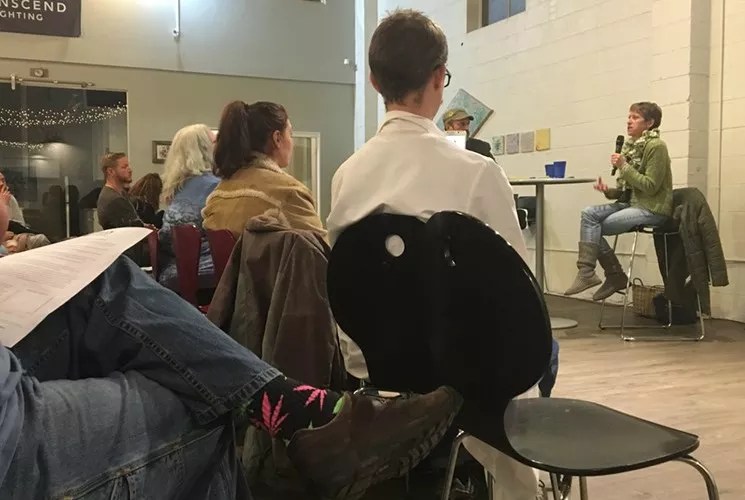
Chloe Sommers

Audio By Carbonatix
Coloradans suffering from mental illness have been left behind when it comes to the state’s legalization efforts, according to Teri Robnett, founder and executive director of Cannabis Patients Alliance. That’s why advocates plan to perform 22 push-ups on the steps of the State Capitol on Monday, January 30, as part of an effort to get Post-Traumatic Stress Disorder (PTSD), among other mental illnesses, on the list of qualifying conditions for medical marijuana in Colorado.
Prospects look bright for SB17-017, which would allow medical marijuana use for stress disorders. Groups supporting the bill had a strategy meeting on January 25, at which representatives from the Cannabis Patients Alliance, along with the Strong Alliance and Veterans for Natural Rights, said they are gaining ground.
About a dozen states, as well as D.C. and Guam, have PTSD listed as a qualifying condition for treatment with cannabis – but Colorado doesn’t. Advocates have been hoping to change the minds of officials at the Colorado Department of Public Health and Environment, the agency involved in approving new conditions. The department has denied earlier requests, however, so the bill is a backup.
“The state government can wait for the research, but we don’t want more people to die in the process,” Robnett says. The department’s scientific advisory board wants more research, she explains, but that’s a catch-22, because clinical trials are next to impossible to conduct with the federally prohibited plant.
The bill was introduced on the first day of the 2017 legislative session and was assigned to the State Veterans and Military Affairs Committee. It’s been scheduled for its first hearing at 2 p.m. Monday, January 30.
A sponsor of the bill, Representative Jonathan Singer, called into the January 25 meeting to express his appreciation for the groups’ support, and said he was exited to hear that there will be a big group on the steps Monday. Highlights of the bill, according to advocates:
– Allows individuals with PTSD to have a conversation with their physician about using medical marijuana in a treatment plan
– Allows veterans with PTSD to participate in a state-authorized medical marijuana program
– Helps PTSD patients who are unable to afford their medicine pay less than the higher price of retail marijuana
– Provides access to medical marijuana strains that are not available in the retail marketplace
“It’s about freedom. We gave out blood, sweat and tears, sometimes our lives for the principle of freedom,” says Colorado veteran Matt Kahl, founder of Veterans for Natural Rights and boardmember of the Cannabis Patients Alliance.
The groups hope the push-ups protest sends a message to state legislators. “We are the face for it, but we are used to carrying the flag,” Kahl says. “We are here for you, and we are going to fight in the halls of Congress just as we did overseas.”
The fight won’t end after the January 30 action. Cannabis Patients Alliance is already planning its third annual Patients Day at the Capitol, on February 14. “It’s an invitation for legislature to come and talk to patients,” Robnett says.